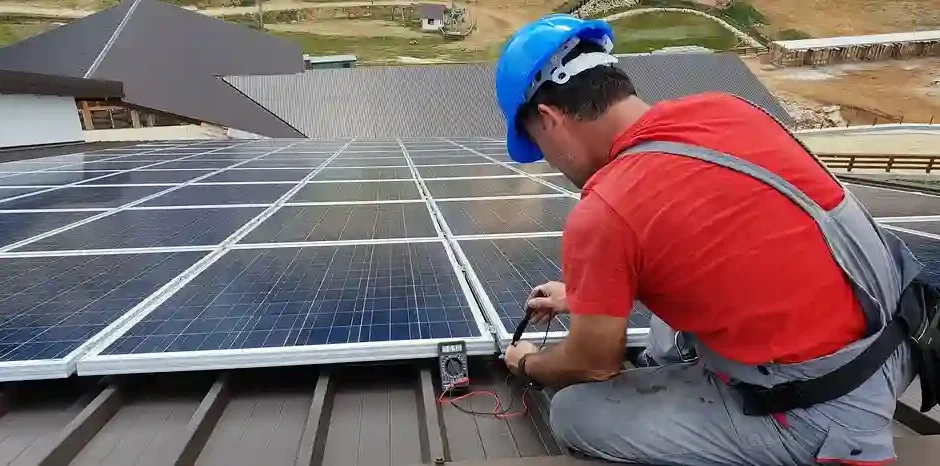Off-grid living, also known as living off the grid, has gained popularity in recent years as people seek self-sufficiency, sustainability, and freedom from traditional utility systems. One of the key technologies that enable off-grid living is solar panels. Harnessing the power of the sun, solar panels provide a renewable source of electricity that allows individuals and communities to live independently from the grid. In this comprehensive guide, we’ll explore the concept of off-grid living, the role of solar panels in achieving self-sufficiency, and the benefits of this lifestyle choice.
What Is Off-Grid Living?
Off-grid living refers to a lifestyle where individuals, households, or communities operate without reliance on traditional utility services such as electricity, water, and sewage systems. Instead, off-grid dwellers generate their own power, collect and purify their water, and manage waste independently. This self-sufficiency allows them to live in remote or rural areas, reduce environmental impact, and have greater control over their resources.
Key aspects of off-grid living include:
1. Energy Independence
Off-grid residents generate their own electricity through renewable sources like solar panels, wind turbines, or hydropower. This energy can be stored in batteries for use during periods of low sunlight or low wind.
2. Water Management
Off-grid living often involves collecting rainwater, using wells, or other methods to secure a clean water source. Water filtration and purification systems are typically used to ensure a safe and reliable water supply.
3. Waste Management
Off-grid individuals or communities implement responsible waste management practices, including composting, recycling, and minimizing waste generation.
4. Sustainable Practices
Off-grid living encourages sustainable practices such as organic farming, permaculture, and reduced energy consumption to minimize environmental impact.
The Role of Solar Panels in Off-Grid Living
Solar panels are a fundamental component of off-grid living, providing a reliable source of electricity without the need for a connection to the traditional power grid. Here’s how solar panels contribute to self-sufficiency in off-grid living:
1. Clean and Renewable Energy
Solar panels harness energy from the sun, a clean and renewable source of power. This reduces the need for fossil fuels, lowers carbon emissions, and contributes to a more sustainable lifestyle.
2. Electricity Generation
Solar panels convert sunlight into electricity through a photovoltaic process. This electricity can be used to power lights, appliances, water pumps, heating systems, and more, enabling a comfortable and modern living environment.
3. Energy Storage
Off-grid living often involves energy storage solutions like batteries. Excess energy generated by solar panels during the day is stored in batteries for use at night or on cloudy days, ensuring a continuous power supply.
4. Low Maintenance
Solar panels require minimal maintenance, making them a reliable and hassle-free source of electricity. Regular cleaning and occasional inspections are typically all that’s needed to keep the system running efficiently.
5. Scalability
Off-grid solar power systems can be designed to meet specific energy needs. They can be scaled up or down as needed, making them adaptable to various living situations, from small cabins to larger homesteads.
6. Remote Locations
Solar panels are ideal for off-grid living in remote or isolated areas where connecting to the grid is not practical or cost-effective. They provide independence and reliability in such locations.
7. Grid Backup
Some off-grid systems incorporate backup generators or other energy sources to provide additional security during prolonged periods of low sunlight or high energy demand.
Benefits of Off-Grid Living with Solar Panels
Off-grid living with solar panels offers numerous advantages:
1. Energy Independence
Off-grid residents are not subject to power outages or utility disruptions. They have control over their energy production and consumption, providing peace of mind and self-sufficiency.
2. Environmental Benefits
Solar panels generate clean energy, reducing greenhouse gas emissions and minimizing environmental impact. Off-grid living promotes sustainable practices and a reduced carbon footprint.
3. Cost Savings
While the initial investment in solar panels and energy storage may be significant, off-grid residents can save money in the long run by eliminating monthly utility bills.
4. Self-Reliance
Off-grid living fosters self-reliance and resilience, as residents learn to manage their resources, conserve energy, and adapt to changing conditions.
5. Remote Living
Solar panels enable off-grid living in remote or rural areas, offering a connection to nature and the ability to live off the land.
6. Reduced Environmental Impact
Off-grid residents often practice sustainable agriculture, conservation, and waste reduction, contributing to a healthier planet.
7. Minimal Impact on Infrastructure
Off-grid living reduces the strain on centralized utility infrastructure, contributing to a more resilient and decentralized energy system.
Considerations for Off-Grid Living with Solar Panels
While off-grid living offers many benefits, it’s important to consider the following factors:
1. Initial Investment
The cost of purchasing and installing solar panels and energy storage systems can be substantial. Off-grid residents should carefully budget for these expenses.
2. Energy Efficiency
Efficient energy use is crucial in off-grid living. Residents should invest in energy-efficient appliances, lighting, and insulation to reduce electricity demand.
3. Location and Climate
The location and climate of the off-grid property can affect the performance of solar panels. Adequate sunlight and weather-resistant panels are essential.
4. Maintenance
Regular maintenance of solar panels and energy storage systems is necessary to ensure they operate efficiently. Residents should be prepared for occasional cleaning and inspections.
5. Backup Power
Having a backup power source, such as a generator or additional energy storage, can be essential during extended periods of low sunlight or increased energy demand.
Conclusion
Off-grid living with solar panels represents a lifestyle choice that offers energy independence, environmental sustainability, and self-sufficiency. By harnessing the power of the sun, off-grid residents can generate clean and renewable electricity, reducing their carbon footprint and minimizing reliance on centralized utility services. While off-grid living requires careful planning and investment, it provides numerous benefits for those seeking a more self-reliant and sustainable way of life. Whether in remote rural areas or secluded cabins, solar panels play a pivotal role in empowering individuals and communities to live off the grid.



